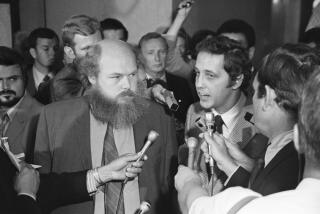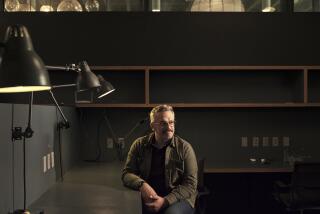Little Drama for Eager Spectators
It had the potential to be better than “General Hospital” or “Days of Our Lives,” and the people crowded in at 9:30 a.m. Monday when the doors were opened to the general public.
They walked swiftly, some scrambling for the best of the 104 seats. Like an excited audience waiting for the symphony to begin, they spent 20 minutes chatting politely until 9:50 a.m.
Then, Superior Court Judge William L. Todd Jr. walked in. Within a few minutes, the closing act in “The Fate of Roger Hedgecock” would begin. Attorneys for the case began to present their closing arguments.
But those who came expecting to hear the tawdry details of a San Diego soap opera were largely disappointed.
Except for a few moments of short-lived emotion, most of the action came in understatement and body language that pitted Mayor Roger Hedgecock in silent struggle against his chief accuser, Assistant Dist. Atty. Richard D. Huffman. Huffman’s arguments took up most of the day.
The struggle came after Hedgecock, who had been sitting at the defense table across the room from the jury during the weeks of testimony, decided to move to a seat that was inside the bar and next to the jury box. Hedgecock said he did this so he could see charts and photographs that Huffman placed on an easel in front of the six-man, six-woman panel.
The move, however, also put the mayor within five feet of Huffman’s left elbow, and the low-keyed prosecutor repeatedly pointed at Hedgecock during the 3 1/2 hours of his closing statements. It was a gesture that helped draw Hedgecock into the tapestry of the alleged conspiracy created by Huffman.
“I think it’s great,” Huffman remarked about the mayor’s choice of seats Monday. “Normally, he’s sitting across at the table and you have to turn around and it is such a phony gesture.”
Yet the move was also good for Hedgecock, who repeatedly used body language to counter Huffman’s assertions that the mayor was a liar, cheat and conniver.
When Huffman reminded the jury that Hedgecock allegedly received free limousine service from J. David & Co., Hedgecock lifted his eyebrows in mock surprise, then shook his head slightly and began scribbling notes on a yellow legal pad.
When Huffman reminded the jury that J. David (Jerry) Dominelli once threw an $8,500 “massive party” to celebrate Hedgecock’s 1983 inauguration and then paid for work on the mayor’s “mansion,” Hedgecock laughed to himself and shook his head again.
Most of the action was lost on the crowd, as it saw only Hedgecock’s back. The jurors, for whom the mayor’s expressions were intended, were reluctant early in the day to look at Hedgecock, but began stealing glances at him during the afternoon.
Juror Victor Whitaker, sitting on the other end of the jury box from Hedgecock, watched the mayor’s face intently as Huffman began to wind down his arguments.
Huffman used an approach that was more thoughtful than entertaining. Comic relief came only once for the attentive jury and audience, when Huffman began talking about a $3,000 check from Dominelli to Hedgecock in December, 1981.
The payment was not listed by Hedgecock on his public reporting forms, and the mayor has contended he did not regard the check as “income” because it was payment for a voters’ list.
Taking a step back, Huffman clasped his hands in front of him after repeating the mayor’s explanation. “Don’t go down to the Internal Revenue Service and offer them this definition of income,” he said, as the audience and jury laughed.
Although he occasionally raised his voice, Huffman spent most of his time talking calmly and standing comfortably behind a lectern, as if to underscore his appeal to the jury’s common sense.
His presentation covered the same ground several times and, on occasion, lapsed into a boring recital of what had been told during the previous weeks of testimony.
“The thing that came through was his quiet, yet very deep, conviction of the righteousness of what he was trying to do,” said attorney Michael Aguirre, who was among a group of lawyers who listened to part of the arguments.
“The lasting impression he left was one about limitations,” said Aguirre, referring to Huffman’s opening lines about the limits San Diego city ordinances place on how much people can give to political races.
Huffman struck this chord again as he finished his argument, saving a flourish to tell the jury that the case against Hedgecock showed a man of “raw ambition, a desire to succeed and to cut corners if necessary. And to scoff at the rules . . . “
J. Michael McDade, Hedgecock’s chief of staff who took a vacation day to listen to the closing arguments, said Monday’s time in court was less than thrilling.
“It’s just going on and on and on,” he said. “I feel sorry for the jurors.”
More to Read
Sign up for Essential California
The most important California stories and recommendations in your inbox every morning.
You may occasionally receive promotional content from the Los Angeles Times.










